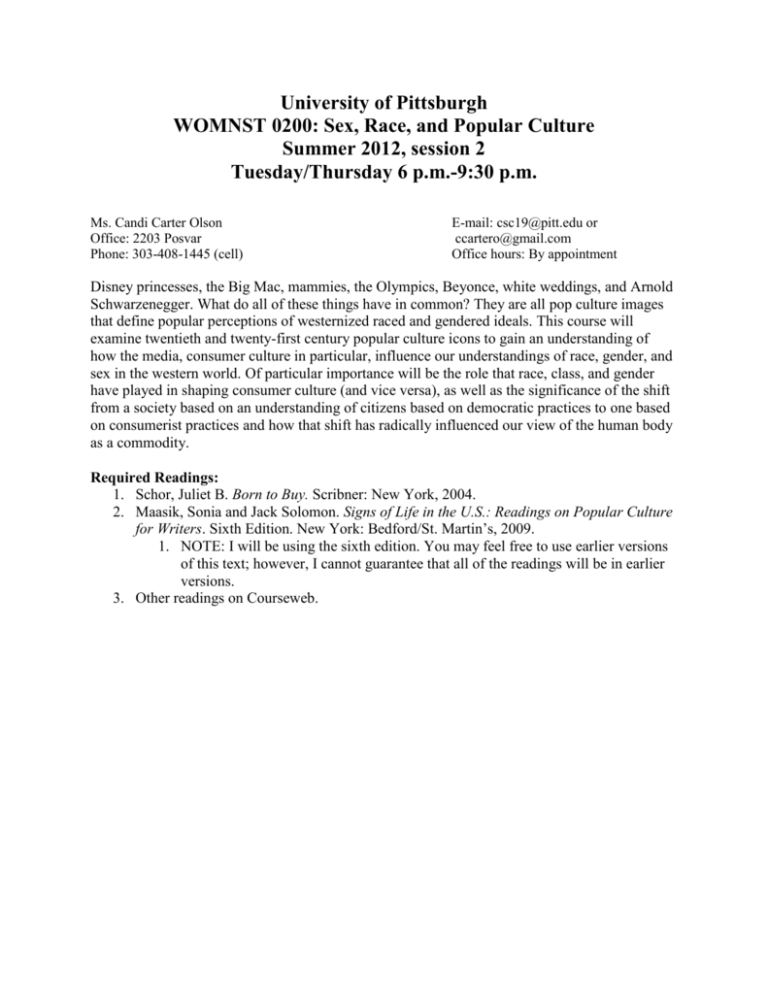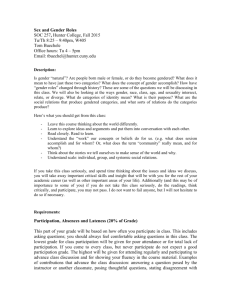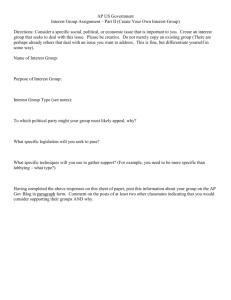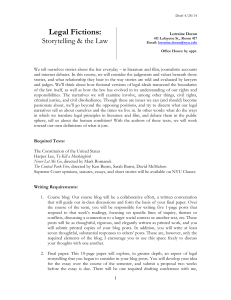
University of Pittsburgh
WOMNST 0200: Sex, Race, and Popular Culture
Summer 2012, session 2
Tuesday/Thursday 6 p.m.-9:30 p.m.
Ms. Candi Carter Olson
Office: 2203 Posvar
Phone: 303-408-1445 (cell)
E-mail: csc19@pitt.edu or
ccartero@gmail.com
Office hours: By appointment
Disney princesses, the Big Mac, mammies, the Olympics, Beyonce, white weddings, and Arnold
Schwarzenegger. What do all of these things have in common? They are all pop culture images
that define popular perceptions of westernized raced and gendered ideals. This course will
examine twentieth and twenty-first century popular culture icons to gain an understanding of
how the media, consumer culture in particular, influence our understandings of race, gender, and
sex in the western world. Of particular importance will be the role that race, class, and gender
have played in shaping consumer culture (and vice versa), as well as the significance of the shift
from a society based on an understanding of citizens based on democratic practices to one based
on consumerist practices and how that shift has radically influenced our view of the human body
as a commodity.
Required Readings:
1. Schor, Juliet B. Born to Buy. Scribner: New York, 2004.
2. Maasik, Sonia and Jack Solomon. Signs of Life in the U.S.: Readings on Popular Culture
for Writers. Sixth Edition. New York: Bedford/St. Martin’s, 2009.
1. NOTE: I will be using the sixth edition. You may feel free to use earlier versions
of this text; however, I cannot guarantee that all of the readings will be in earlier
versions.
3. Other readings on Courseweb.
Assignments and Grading:
Percentage Scale for Final Grades
98-100
A+
93-97
A
90-92
A88-89
B+
83-87
B
80-82
B78-79
C+
73-77
C
70-72
C68-69
D+
63-67
D
60-62
D59 and below
F
Assignments and Points Available
Introduction blog
25 (15 for your original post, 10 for a response)
Blog #1
100
Blog #2
100
Blog #3
100
Blog responses and class participation
100 (25 per response, 25 for class participation)
Prewriting, including thesis and outline
25
Rough Draft:
100
Final Paper:
200
----------------------------------------------------------Total possible:
750
Introduction Blog (25 points): This class has a lot of reading that requires students to think
critically about their own perceptions of gender and their media consumption. All students will
be expected to have read all readings for the day and to be able to interact knowledgably about
the course materials. Also, I will give in-class group work that will require your participation and
an ability to apply the course materials to questions and situations that are relevant to
contemporary American lives. I will give daily marks for discussion and involvement in class, so
your active participation will help to bolster your grade.
Blog posts (100 points each, 25 points for the introduction): As we are studying how media
influences the creation of gendered norms and the ways that the women’s movement has been
viewed, it’s important for us to also be involved in the creative mediation process so that we can
see the ways that norms are perpetuated from both sides of the equation. To this end, the students
in this class will build and maintain a group of writings and contributions on a course blog.
Students will have to contribute three posts each, plus an introductory post. These blog posts will
also allow us to engage in conversation with our colleagues in China. Our first blog post is due in
week 2 and will cover the business and marketing of marriage. Your response for blog 1 will be
due by class time on week 3. Blog 2 is due on week four, and for this post, you may choose to
either respond to our food readings or our race readings. Your responses will be due by Thursday
on Week five. For Blog 3, you must watch the opening ceremonies for the London Olympic
games and respond to them using all of the readings we’ve done throughout the class, but
particularly the readings on sports and entertainment. We will schedule a class party to watch the
ceremonies, if you would like to do the viewing together. This post will be due by Tuesday on
week 6; however, because this is the last week of class, you will also need to get a response in by
Thursday of the same week.
Blog Responses and class participation (125 points): This is fairly straightforward. I expect all
students to interact with their peers both in class and online. Twenty-five points of this grade
comes from your introductory blog post and response. You will receive 25 points for each
response you give to another student’s posts for blogs 1-3, and then the final 25 points is earned
by your in-class participation and through any additional blog posts you put up.
Prewriting work, including thesis and outline (25 points): I will require all students to give me a
top proposal with a preliminary these for their final paper. You will receive instructions for this
assignment in class.
Rough Draft (100 points): You will receive instructions for your final paper and the rough draft
in a separate document.
Final paper (200 points)
Course Policies
Class participation: I expect every student to help keep class interesting by adding his or her own
perspective and research to class time. All students must do their homework and be prepared to contribute
during class time. I enjoy hearing what you have to say, and I’m sure your fellow students will appreciate
your participation also, since it means hearing less of your instructor’s voice.
Ground Rules for Class Discussion and Participation: Class discussion relies on students feeling
comfortable expressing a variety of viewpoints, and sometimes those viewpoints may be controversial.
Therefore, in order to build a supportive class environment that encourages student participation and
camaraderie, please observe these ground rules:
1. Please show respect to both me and your fellow classmates by avoiding offensive language.
2. Please offer your input for class discussions when it is appropriate. This will help the class to
see different viewpoints.
3. Be an active listener and respectfully listen to viewpoints that you both agree with and
disagree with.
4. Remember that we do not need to agree at all points in time. Sometimes we can agree to
disagree.
5. You may question your fellow students in a respectful manner if you want to understand their
standpoint better.
6. You do not need to answer any question if it makes you uncomfortable.
7. If you feel uncomfortable speaking in class, it is your responsibility to speak with me outside
of class time.
Attendance and tardiness: Because this class hinges on your involvement, attendance is mandatory.
You are allowed four absences without penalty, with no questions asked. After the fourth absence, your
final grade will begin to go down by ½ letter grade for each additional absence (i.e. A- to B+, B-to C+,
etc.). Absences that are excused per university policies require written notice from an activity/athletics
advisor in advance of the absence. More than four absences (the equivalent of two weeks of class) could
be grounds for automatically failing the course. Please also be considerate and show up for class on time.
If you miss a day of class, it is your responsibility to get notes from another member of the class.
Please find a class partner whom you can contact in the event that you must miss a class period.
Plagiarism and Academic Integrity: According to University policy, “Students in this course will be
expected to comply with the University of Pittsburgh’s Policy on Academic Integrity
[https://www.pitt.edu/~provost/ai1.html]. Any student suspected of violating this obligation for any
reason during the semester will be required to participate in the procedural process, initiated at the
instructor level, as outlined in the University Guidelines on Academic Integrity.”
More specifically: Plagiarism and academic dishonesty will not be tolerated in this course. Plagiarism is a
form of academic theft. It is defined as using another person’s unique words or ideas without giving that
person credit. Academic dishonesty is a slightly broader category encompassing a range of issues,
including double-dipping without instructor approval, cheating on an exam, fabricating information or
sources, or helping another student to cheat (aiding and abetting).
This class has a no-tolerance policy on plagiarism. The first time a student is caught in either
plagiarism or academic dishonesty, he or she will receive an automatic F in the course. If you have
questions about anything you think might be a grey area, please talk to me immediately. I’m happy
to discuss anything you think is unclear before it becomes a problem for your grade.
My disclaimer: Please be aware that I want you to follow simple rules. Deadlines and specifications are
part of my grading system. When I say “5 minutes,” I want to see students deliver a 5-minute speech—not
a minute and a half or 10 minutes. Please refer to your assignment sheets for information on what I expect
and feel free to contact me about anything that is unclear. Please refer to my grading rubric for more
information on what I expect out of your speeches and writing.
Late Work: All work is due at the beginning of the class period on the day for which it is assigned, and
presentations must be delivered on the day you are scheduled. Presentations may not be missed for any
reason except documented illness or family emergency.
Standard grade deductions for missed assignments are as follows: Any assignment that is missed without
a documented illness or family emergency will receive an automatic deduction of 10 points per 24 hour
period until the student comes to my office hours with the assignment. The first deduction is taken
immediately after the class during which the assignment was due. The next deduction is then taken at the
time class might begin the next day. (For example, if you’re in a Monday 9 a.m. section, your next grade
deduction will be taken Tuesday at 9 a.m.) The deductions continue every 24 hours as outlined above. An
assignment will not be accepted if a student has not come to my office hours or arranged a makeup
time within a week after the original due date.
It is your responsibility to get homework assignments for any class you miss. An excused absence does
not excuse a late homework assignment. Also, all homework must be in a format that I can accept. I
cannot accept your laptop computer because your printer died an hour before class (Yes, this has actually
been tried.), nor will I accept computer discs.
Homework: Handwritten homework is not acceptable. Please submit all homework in 12-point Times
New Roman font, and remember that double spacing is important for written work. Homework will not
be accepted via e-mail. It must be submitted in hard copy during class. If an electronic backup is required,
you will find a dropbox on Blackboard.
Grade Grievances: If you would like to dispute a grade, please allow at least 24 hours after receiving the
grade sheet. All disputes must be addressed in person during my office hours or at another time that we
arrange.
Cell phones and laptops: As you enter the class, please turn off your phone as a courtesy to your fellow
classmates. A student whose phone rings during class will have to endure either myself or a fellow class
member answering the phone and taking a message. If you don’t know how to turn your cell phone off,
please either leave it at home or read the owner’s manual.
Please remember that having a laptop in class is a privilege. Laptops can be a useful educational tool, but
they’re often misused. On an average day, you should not need a laptop in this class. If you find that you
need one on a particular day, you’re welcome to use it. However, I will feel free to frequently check that
you are not surfing the net, doing homework for other classes, e-mailing, or IMing friends. If I catch
anyone doing any of these activities, I will revoke the privilege of laptops on average class days for
everyone. (Laptops will still be allowed for presentations.)
Students with Disabilities: If you have a disability for which you may need or want accommodations,
you will need to contact both your instructor and the Office of Disability Resources and Services, 216
William Pitt Union, 412-648-7890 (telephone), 412-383-7355 (TDD), or 412-624-3346 (Fax). DRS will
verify your disability and determine reasonable accommodations for this course. NOTE: Your instructor
cannot make accommodations for your disability unless you contact DRS and receive instructions from
that office. You must accomplish this within the first two weeks of class, or your instructor may not be
able to accommodate your disability to your satisfaction.
Office hours: Please think of my office hours as your time to discuss your concerns with me. My office
hours are free and no appointment is required. Please feel free to drop by. I’d love to speak with each of
you. Remember, it’s easier to discuss something before it becomes a crisis than it is to troubleshoot a
problem after it has become a major issue.
E-mail policy: Please allow me 24-48 hours to respond to your e-mail. I will usually get back to you
before that time. If I have not responded within that time, assume that I have not received your e-mail and
resend it.
Final notes: Have fun! I want this class to be a place where you learn to write fantastic speeches, wow an
audience, and enjoy yourself all at once. If you’re having fun and contributing, I guarantee we’ll have a
great class.
Campus Resources
The Oral Communication Lab: Offers assistance with speech anxiety, delivery, organization, choosing
topics, and other speaking-related issues.
1109 Cathedral of Learning.
Call 412-624-6570 or e-mail mbannon@pitt.edu
The Writing Center: Offers writing consultation services for undergraduates, graduates and faculty.
Papers in all stages, from brainstorming to “final” product, are welcome.
www.english.pitt.edu/writingcenter 412-624-6556
Disability Resources and Services: Offers assistance to students who need documentation of and
accommodations for disabilities of any kind.
www.drs.pitt.edu 412-648-7890
The Office of International Studies: Offers support for international students and students studying
abroad. http://www.ois.pitt.edu/
Writing and Citation Resources
The University of Pittsburgh RefWorks training: Pitt provides its students with a free, online citation
tool that allows students to build and maintain their own reference dictionaries. To sign up for training, go
to http://www.library.pitt.edu/services/classes/infoliteracy/refworks_training.html.
The Purdue University OWL: One of the most comprehensive citation and writing resources available
on the web. http://owl.english.purdue.edu/.
Duke University Library Citation site: My favorite citation Web site because it puts five citation styles
side by side. http://library.duke.edu/research/citing/.
Class Schedule: Introduction to Women’s Studies, Fall 2011
*Please note that this schedule is subject to change depending on class needs.
Week 1: Introduction to class and popular culture
Tuesday, June 26, 2012
Introduction to class
Thursday, June 28, 2012
Signs of Life:
Thomas L. Friedman, “Revolution is U.S.,” 157-162
Thomas Frank, “Commodify Your Dissent,” 163-168
Courseweb:
Stuart Hall, “Notes on Deconstructing ‘the Popular’,” in Cultural Theory and Popular Culture: A Reader,
ed. John Storey (New York: Pearson/Prentice Hall, 1998), 442-453.
Fiske, “Understanding Popular Culture”
Jean Kilbourne, “‘In your face, all over the place’: Advertising is our environment,” in Can’t Buy My
Love: How Advertising Changes the Way We Think and Feel, (New York: Touchstone, 1999), 57-75.
IN Class: Watch Frontline’s “The Persuaders.”
Week 2: Commodity Culture
Tuesday, July 3, 2012
DUE: BLOG 1, Weddings
Signs of Life:
Sean Cahill, “The Case for Marriage Equality”
Jack Solomon, “Masters of Desire: The Culture of American Advertising,” 524-535.
Courseweb:
Hagedorn, White Weddings, “Chapter 2: The Wedding Industrial Complex.”
Nicole A. Constable, “Romance on a Global Stage: Pen Pals, Virtual Ethnography, and “Mail-Order”
Marriages.”
Compilation of articles on gay marriage from the last six weeks of the New York Times
Thursday, July 5, 2012
Signs of Life
Aaron Devor, “Gender Role Behaviors and Attitudes,” 567-572.
Deborah Blum, “The Gender Blur: Where does Biology End and Society Take over,” 573-580.
Jennifer L. Pozner, “Dove’s “Real Beauty” Backlash,” 214-216
Emily Prager, “Our Barbies, Ourselves,” 613-615.
Deborah Tannen: “There is no unmarked woman,” 620-624.
Courseweb:
Jean Kilbourne, “The more you subtract, the more you add,” in Can’t Buy My Love: How Advertising
Changes the Way We Think and Feel,” (New York: Touchstone, 1999), 128-154.
IN CLASS: Watch Miss Representation
Week 3: Youth culture
Tuesday, July 10, 2012
Juliet B. Schor, Born to Buy, (New York: Scribner, 2004). Read all except chapters 5 and
Thursday, July 12, 2012
ONLINE:
Peggy Orenstein, “What’s Wrong with Cinderella?” New York Times, 24 December 2006,
http://www.nytimes.com/2006/12/24/magazine/24princess.t.html
Damien Cave, “The Tyranny of Abercrappie,” Salon.com, 3 March 2000,
http://www.salon.com/2000/03/03/abercrappie/
Courseweb:
Sherrie A. Inness, “It’s a Girl Thing”: Tough Female Action Figures in the Toy Store.”
Neal A. Lester, “Disney’s The Prince and the Frog: The Pride, the Pressure, and the Politics of Being a
First.”
Signs of Life
Eric Schlosser, “Kid Kustomers,” 222-226.
Week 4: Race, nationalism, and popular culture
Tuesday, July 17, 2012\
DUE: Thesis statement, two-paragraph description of project
IN CLASS: Dinnertime! Bring a food that represents you and/or your culture to share with the
class.
Courseweb:
James Watson, “McDonalds in Hong Kong: Consumerism, Dietary Change, and the Rise of Children’s
Culture.”
Krishnendu Ray, “Exotic Restaurants and Expatriate Home Cooking: Indian Food in Manhattan,” from
The Globalization of food, eds David Inglis &Debra Gimlin.
Warren Belasco, selection from Food: The Key Concepts.
Igor Cusak, “Pots, Pens, ‘Eating Out the Body’: Cuisine and Gender of African Nations.”
Rumi Sakamoto and Matthew Allen, “There’s Something Fishy About Sushi: How Japan Interprets the
Global Sushi Boom.”
Thursday, July 19, 2012
DUE: BLOG 2, Race OR Food
ONLINE: *PLEASE LOOK UP JIM CROW MUSEUM OF RACIST MEMORABILIA AT FERRIS
STATE UNIVERSITY. http://www.ferris.edu/jimcrow/. We will be using this as one of our primary
texts for the day. Read through as many of the descriptions and caricatures as you can, particularly some
of the overviews of the museum, the Beast, the Jezebel, the Tom, and the Mammy.
Signs of Life:
Cynthia Tucker, “Thug Culture is a Cancer Destroying Black America,” 326-330.
Michael Omi: “In Living Color: Race and American Culture,” 655-666.
Greg Braxton: “Hollywood Loves BBFs 4-Ever,” 667-671.
Nell Bernstein, “Goin’ Gangsta, Choosin’ Cholita,” 691-696.
Melissa Algranati, “Being an Other,” 697-701.
Rebecca Traister, “Class Act,” 672.
Week 5: Gender, sports, and entertainment
Tuesday, July 24, 2012
Signs of Life
Steve Craig, “Men’s Men and Women’s Women.”
Marisa Connolly: “Homosexuality on Television: The Heterosexualization of Will and Grace,” 315-325.
Todd Boyd, “So you wanna be a gangsta?” 375-387
Jessica Hagedorn: “Asian women in Film: No Joy, No Luck,” 387-396.
Courseweb:
S. Elizabeth Bird, “Tales of Difference: Representations of American Indian women in Popular Film and
Television.”
Susan J. Hubert, “What’s Wrong With This Picture?: The Politics of Ellen’s Coming Out Party.”
IN CLASS: The Celluloid Closet.
Thursday, July 26, 2012
DUE: Rough draft, 3-5 pages
Signs of Life:
Mariah Burton Nelson, “I won. I’m sorry,” 539-545
ONLINE THROUGH THE LIBRARY (If you are off campus, be sure you login on the proxy server or
you will not be able to access this resource. If you’re on campus, you may wish to simply print this off
while you’re here. Sometimes the proxy server makes it difficult to access online books.)
Eileen McDonagh and Laura Pappano, Playing With the Boys: Why Separate is not Equal in Sports,
Chapter 1: What’s the Problem?
Michael Messner: Taking the Field: Women, Men, and Sports, Chapter 2: The Triad of Violence
Week 6: Digital culture and presentations
Tuesday, July 31, 2012
DUE: BLOG 3, The Olympics
COURSEWEB:
Tom Boellstorff, Coming of Age in Second Life: An Anthropologist Explores the Virtually Human,
Chapter 5: “Personhood,” Princeton, NJ: Princeton University Press, 2008, pgs. 118-150.
Signs of Life:
Henry Jenkins, “Convergence Culture,” 432-445.
Clive Thompson, “Game Theories,” 460.
A.B. Harris, “Average Gamers Please Step Forward,” 465-467.
Joanne Cavanaugh Simpson, “Multitasking State of Mind,” 469-472.
David Teten and Scott Allen, “Free Speech and Censorship in Online Communities,” 473-476.
Thursday, August 2, 2012
Presentations
Saturday, August 4, 2012: FINAL Paper Due, 5-7 pages






